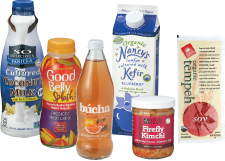What is the difference between a probiotic and a prebiotic?
by Nick Rose, M.S., PCC Nutrition Educator
This article was originally published in January 2012

Probiotics are good bacteria found in fermented/cultured foods that find a home in our digestive system. These beneficial microorganisms assist with normal digestion and benefit our immune system. Probiotic-rich foods include yogurt and kefir, miso and tempeh, sauerkraut and kimchi, and kombucha, the wildly popular fermented tea.
Probiotics can be identified by their specific strain, such as acidophilus, bifidus, or rhamnosus. Dozens of different strains of bacteria have been identified, and often they are listed on a label as colony-forming units (CFUs), the number of bacterial cells estimated to colonize the GI tract
per serving.
Prebiotics are unique carbohydrates found in certain foods that our bodies cannot digest (similar to fiber). The prefix “pre” is a hint: They are “foods” that nourish good probiotic bacteria. Food sources of prebiotics include sunchokes (also called Jerusalem artichokes), onions and garlic, whole grains, honey and maple syrup. Both prebiotics and probiotics also are available as a dietary supplement.
There is no established recommendation for our daily intake of probiotics or prebiotics, but regular consumption of both is a good idea. These good bacteria benefit our immune system in a variety of ways. First, once probiotic bacteria take up residence in our GI tract, they can prevent other (potentially pathogenic) bacteria from colonizing the same space. Second, many species of good bacteria can increase the production of immune cells in the intestines. Third, some strains even secrete proteins that kill foreign bacteria that otherwise would make us sick.
Probiotics really come to our rescue during cold and flu season. Researchers have shown that children supplementing with a combined prebiotic and probiotic have fewer colds and fewer sick days from school.

Probiotics to boost immunity
Boost your immune system naturally by eating foods rich in probiotics. Our health and body care department also offers high-quality probiotics in supplement form.
- Yogurt — PCC’s entire selection features live active cultures that promote healthier digestion and nutrient absorption. Choose from yogurt made from the milk of cows, sheep, goats, coconuts, almonds, soybeans or rice, from a variety of producers.
- Fermented condiments — Find the robust flavor of locally made Firefly Kitchens feremented raw vegetables at all PCC locations. Each store carries a selection of their salsa, sauerkrauts and kimchi.
- Kefir — Enjoy your yogurt in drinkable form. PCC offers dairy and non-dairy kefir in a variety of flavors from Nancy’s, Lifeway, Helios, Redwood Hill Farm and So Delicious, as well as probiotic fruit drinks from Good Belly.
- Kombucha — Enjoy the effervescence of these elixirs, available from Bucha Kombucha, Kombucha Wonder Drink and GT’s. Craving something sparkling but smooth? Try Coconut KeVita, an organic probiotic drink.
- Miso/Tempeh — Use miso paste to make a warming soup or add to stir-fries for deep, salty flavor. Cut tempeh, a nutty soybean cake, into slices and use in chili, stir-fries, soups, salads, sandwiches and stews.
